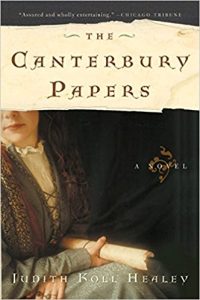Book Group Guide
How I Came To Write The Canterbury Papers
The politics and arts of the era of Eleanor of Aquitaine and Henry II Plantagenet have long captured me. These were the times in which the Grail stories were written, stories which many believe fictional. Yet the times, the 12th Century, were more dramatic than the Arthurian legends of the Holy Grail.
I had known since I was a child about the troubadours, about Robin Hood and his Merry Men and about the courts of love which Eleanor held in Poitiers. But it was later that I found out that Henry left a vivid legacy as well, since he gave us the system of local governance that is the basis for our common law today.
When I was a child I was equally fascinated by the Crusades and heard stories of the noble Saladin and Richard, King of England. It was only later that I understood the geo-political context of these tales. Initially, I just saw them as fascinating stories about leaders.
In recent years I became ‘hooked’ on reading history in this period, and one day, while traveling in France, I stumbled on the story of Alais and Henry. The chronicles of the time indicated that Alais, a ward of Henry and Eleanor and daughter of their sometime enemy and Eleanor’s first husband Louis, King of France, may have had a child by Henry when he was older and Alais was only in her teens. But the chronicles are mysteriously silent about the fate of that child, who could have been heir to either or both kingdoms of France and Italy.
Fascinated by the possibilities, I asked myself: What if? What if Alais thought the child dead? What if it had survived? What if she discovered he was alive and sought to find him, when he was grown?
Thus was born this novel. Because I had read so much history, I didn’t do research as such, except on food and clothes. I had to check facts, of course, and modify some things as I was going along. But the story came easily because I became so interested to see how it would turn out!
Questions For Discussion
1. In the constant battles between England and France in this period, what did each kingdom seek? Did Louis and Henry appear to be sworn enemies? Did they have any common goals?
2. Why was King John, sometimes called Lackland in so much trouble with the church? What do you imagine his goals were? From the perspective of this story, does it appear he will be a successful king? Why or why not? What qualities does he evidence or lack that supports your opinion?
3. What do you make of the affair of Alais and Henry? Was he wrong to express his feelings as he did? What attracted him to Alais? What did she feel or not feel about him?
4. Why does William have access to so many resources? Where does his power come from? What are his gifts, in your opinion? What are his shortcomings?
5. What feeling dominates Alais at the beginning of the novel? Why does she undertake this journey? Is she putting herself in danger with her small party? Why or why not? Do you agree with her uncle’s assessment of her when they meet at the Boar’s Head Inn? What would you say her most significant asset is?
6. What role does her art play in her habits of thinking and seeing? What role did it play in her various assessments of the situation while she was traveling? Do artist generally see things other miss?
7. Alais had a physical difference about her. How did she treat this difference or think of it at various times? What do you know about what people thought of physical deformities in the middle ages? Where is the evidence of this in the book?
8. What is the major change Alais experienced in the course of this story. What aspects of the final scenes illustrate this change? What specific events in the story have helped to bring about that change?
9. Where in the book does Alais demonstrate courage? Where do you think she is rash? Would you have counseled her to do other than she did in any of the scenes?
10. This story was set in the time that the Grail stories were written. The original Grail stories were written by Chretien de Troyes, whose patron was Marie, Countess of Champagne, daughter of Eleanor and Louis. How could you view The Canterbury Papers as a grail story? What similarities are there between Alais’ quest and the grail knights’ quest? If Alais found a grail at the end of this story, what would it be? Would it be a person, or a quality, or a state of mind?

